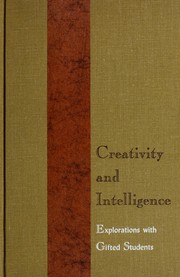Check nearby libraries
Buy this book

Creativity is one of the most highly valued of human qualities. It is also one of the most elusive to systematic inquiry. Questions without end have been asked and re-asked. What is the nature of the creative process? Can creative potential be identified before creative achievement? What is the effect of family environment on creative development? What is the relationship between creativity and personality? Between creativity and intelligence? We ourselves begin with the last question, hoping that in the course of seeking an answer we shall throw light on the other issues. The concept of intelligence and the consequent intelligence measure have been used to define individual differences in cognition as if the concept and the measure encompassed the totality of the human mind and imagination. In school, and more recently in other areas requiring intellectual accomplishment, the IQ (or some cognate of it) has become the critical metric on which individuals are evaluated and sorted, given preferment or denied it. Individual differences in potential for productive thinking have been made synonymous with individual differences in performance on one or another of the numerous intelligence tests. We began our studies with few preconceptions and few presuppositions. We did not begin (as is our more usual preference) with an explicitly stated theoretical framework and a set of formal hypotheses. Instead, we permitted the behavior of the children and our own interests, whatever their conceptual foundation, to lead us from problem to problem and from question to question. That this procedure enabled us sometimes to come upon fascinating new vistas in the behavior of children seemed worth the cost of being often lost in phenomena without relevant explicit concepts to guide our observations.
Check nearby libraries
Buy this book

Previews available in: English
Subjects
Creation (Literary, artistic, etc.), Gifted children, Psychologie, Adolescenten, Intelligence, Intelligence chez l'enfant, Creativiteit, Creativite, Imagination, Begaafden, Gifted Child, Enfants surdoues, Intelligentie, Adolescents, Créativité, Enfants surdoués, Creation (Literary, artistics, etc.), Creativity, Adolescent, CreativenessShowing 4 featured editions. View all 4 editions?
| Edition | Availability |
|---|---|
|
1
Creativity and intelligence: explorations with gifted students
1968, Wiley
in English
- [First corrected printing, 1968]
|
zzzz
Libraries near you:
WorldCat
|
| 2 |
zzzz
|
| 3 |
aaaa
Libraries near you:
WorldCat
|
|
4
Creativity and intelligence: explorations with gifted students
Publish date unknown, Wiley
in English
|
zzzz
|
Book Details
Edition Notes
Includes bibliography.
Classifications
The Physical Object
ID Numbers
Source records
Scriblio MARC recordIthaca College Library MARC record
Internet Archive item record
OpenLibraries-Trent-MARCs record
marc_openlibraries_sanfranciscopubliclibrary MARC record
Internet Archive item record
marc_claremont_school_theology MARC record
Library of Congress MARC record
marc_claremont_school_theology MARC record
marc_uic MARC record
harvard_bibliographic_metadata record
marc_columbia MARC record
Community Reviews (0)
Feedback?| December 14, 2023 | Edited by MARC Bot | import existing book |
| July 11, 2022 | Edited by MARC Bot | import existing book |
| July 24, 2020 | Edited by MARC Bot | import existing book |
| February 13, 2020 | Edited by MARC Bot | remove fake subjects |
| December 10, 2009 | Created by WorkBot | add works page |










